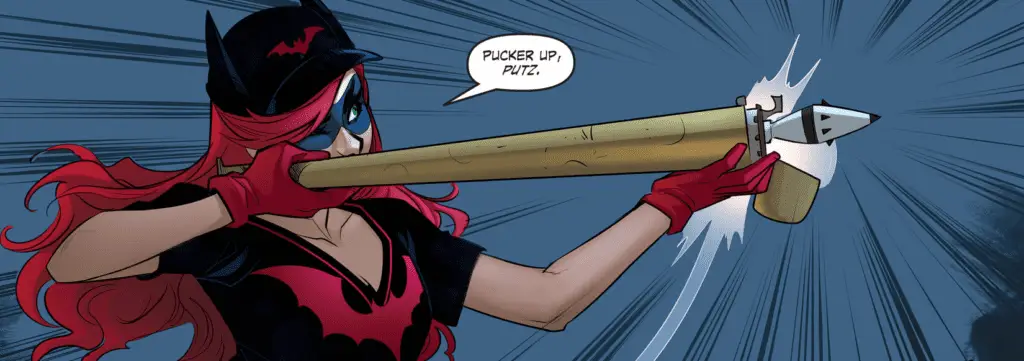Something happened on February 15th that shook me to my core. It created a disturbance in the force. In one panel of the first Batwoman Rebirth issue, Kate Kane got punched in the face and said, “vey’z mir.”
I’m sorry, I should have warned you to sit for that. Because as small as it sounds, this was literally the first time I ever saw a Jewish character dropping some casual Yiddish as an involuntary response, rather than a joke. A female Jewish character.
Now Kate Kane is a ridiculously amazing example in this department because Marguerite Bennett is ridiculously good at doing her goddamn homework. But it made me realize something I hadn’t before: female Jewish representation is just terrible.
Okay, this is hardly shocking. Jewish representation as a whole is a bit lacking. When Griffin and I were trying to think of other Jewish characters (not counting those from Seinfeld, Broad City, or Curb Your Enthusiasm), we only managed to list the Broflovskis in South Park, Boris and Minka in Rugrats, and Ross and Monica from Friends off the top of our heads. Once I began thinking more deeply and compiled a list, I realized that even in cases where there is an explicitly Jewish character, more often than not it’s an informed attribute, and/or they’re trotted out for a holiday special like Sam in Danny Phantom or Arnold in The Magic School Bus (though his anxiety actually plays fairly well here).

But what I’ve noticed is that of the few Jewish characters we do get, there’s a concerning pattern where only the men are allowed to feel Jewish.
Look, before I get further into this, it needs to be said that Jewishness is not exactly simplistic. I think to a lot of non-Jews, there’s an assumption that being Jewish is all about practicing a religion and following a given set of rules. If a character keeps kosher and mentions that, then it’s great representation! And yeah, it’s not like there aren’t religious Jews who refrain from getting tattoos and eating shellfish, because of course there are. But, especially for a lot of American Jews, it’s not so clean-cut. Reform Jews rarely keep Kosher or get overly-fussed if they drink water on Yom Kippur (or even sometimes…eat). There’s also these people called “secular Jews”, whose Jewishness is felt on a cultural level, but not on a religious one.
You know, maybe these are the kinds of people who didn’t have a Bat Mitzvah when their cousins did, because maybe their mom didn’t elect to have one of her own because maybe her brother had come home from Hebrew school crying every day, so when she raised kids she skipped that gantseh megillah with them, but it made them feel a little insecure at their uncle’s seder table when they mispronounced the prayers, almost as if they were faking being there somehow. Not that I’d know anything about this…
Being recent survivors of genocide (within the last century, at any rate), it’s not exactly shocking there’s a collective Jewish identity that matters even outside of those who practice Judaism as a religion, especially when so much of that identity is steeped in heavy oral tradition and collective memory. Actually here, let me just let Kate explain it:
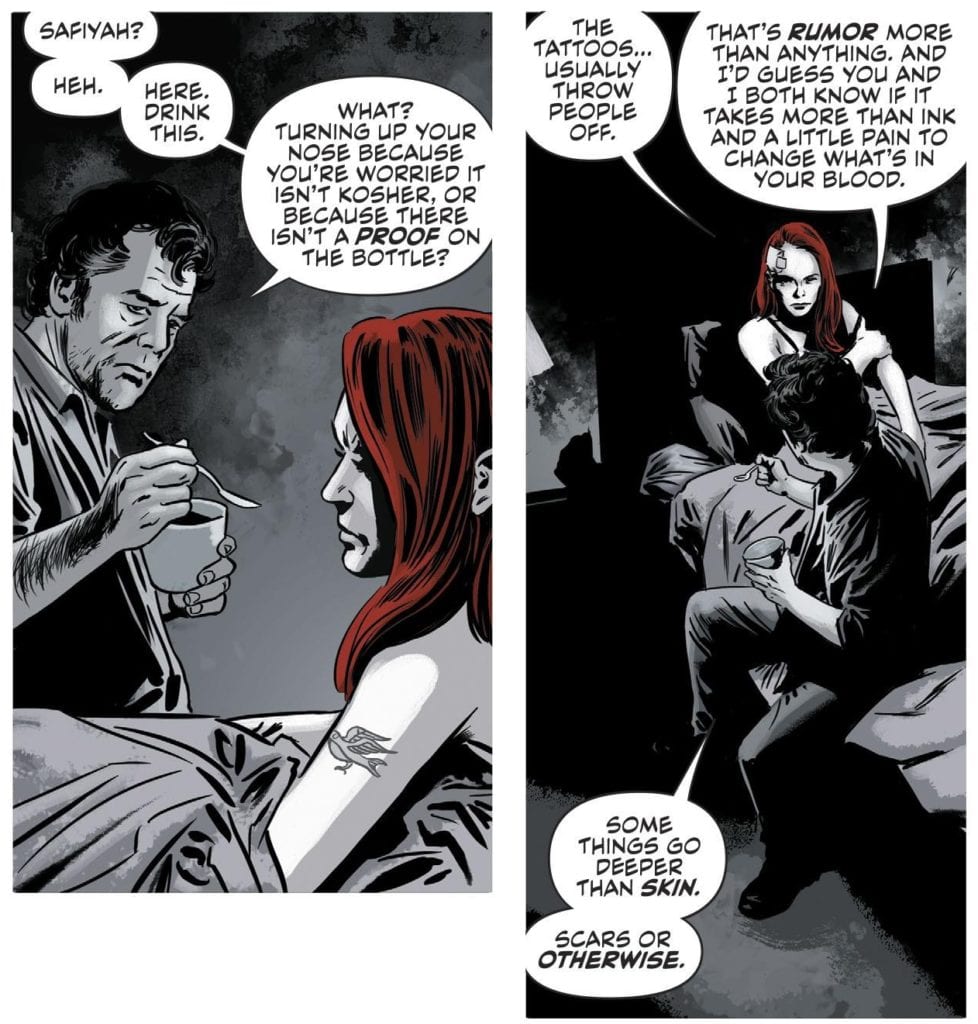
That identity, ya know, matters and affects things. So characters that are made Jewish without any respect to that…stick out.
At the same time, we’re not a monolith. Not every Jew mixes Yiddish words into everyday speech (Griffin had trouble understanding me when we first met), we don’t all answer questions with another question, and I think only 96.3% of us are neurotic. So, whether a character feels Jewish is a bit ineffable and definitely subjective.
For example, both Elaine and George on Seinfeld read to me as incredibly Jewish. This is hardly surprising given that they were created by Larry David and Jerry Seinfeld, played by Julia Louis-Dreyfus and Jason Alexander, and George was more or less supposed to be Larry. Yet both of them are canonically not. Why do they feel Jewish? Well, the answer to that is probably going to sound horrible and full of stereotypes. Elaine is sarcastic, often angry, and pedantic about exclamation point placement! George is cheap, self-deprecating, and has a nagging mother! Yeah, I know how this seems, believe me. And I’m not saying that the very cynical, New Yorker vibe is the only way a character can feel Jewish, nor that everyone with it is automatically a Jew. I am saying, however, there is a certain coding that can be instantly recognizable as Jewish, even without it being stated.
Yet there is a clear pattern regarding that coding: only male characters tend to evince it.
Sandy and Seth Cohen from the OC are unabashedly Jewish. Seth is almost the embodiment of the “nice Jewish boy” stereotype, while his lawyer father throws bagel and schmear parties. I can’t make this up.
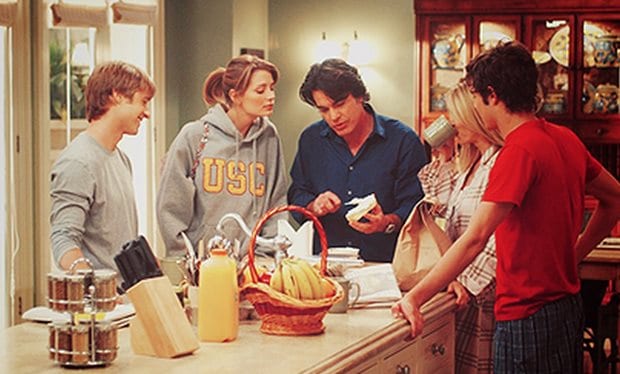
Kristen, Seth’s mom, is Christian. This is actually played as a culture clash in a pretty significant way, and you can tell that Sandy feels pre-judged by the Newport WASPs he has to interact with daily. Seth, in a response to his parents’ mixed backgrounds, created the all-important holiday of ‘Chrismukkah’, even though calendar dates rarely line up in a way where this makes sense. Just sayin’.
This Jewish dad/gentile mother combo is also the case with the Botwin family in Weeds. And Harley Quinn’s parents. And Ross and Monica Geller’s parents.
Listen, I fully understand and appreciate the shiksa-appeal as a trope, but isn’t it just a tad suspicious that Jewish characters are far more likely to have Jewish dads? Especially given the importance placed on matrilineality for Jews?
I’m not even sure I can think of a counter example where a character has a Jewish mom and gentile father aside from Rugrats. To that, while I’ve sung the praises of Didi’s parents, Boris and Minka with their heavy Yiddish accents and glue-like borscht, Didi herself doesn’t feel Jewish in any respect. Like, when driving to her parents’ seder, her husband keeps going on about how terrible and boring this holiday is, and her response is mild annoyance. I also don’t think I can recall her uttering a single Yiddish word despite her parents likely being fluent. Oh and her brother got married in a church.
All of this could happen (just like a Jew could have a Christmas tree; I actually know a good number of families who didn’t want their kids to feel ‘left out’). But the fact is, if Boris and Minka had been made Stu’s parents, it’d make just as much sense. For Didi, it’s completely an informed attribute.
Even in the case of two Jewish parents, the mom is usually toned down, with the dad being the more devout one (though Batwoman subverts this, because of course it does). Willow from Buffy is maybe the best example here. Her mom was distant and kind of hard to get a handle on anyway, while her dad was the dude who was so Jewish that he banned her from watching A Charlie Brown Christmas. Which is just crazy; that soundtrack is amazing.
That’s really the crux of it: even outside of motherhood, Jewish women in media are dialed back more than male counterparts.
Heck, Willow fits into this to a degree. They tried with her, and to Whedon’s credit, she asserted her Jewishness every time something would come up like Christmas (no she doesn’t celebrate it!) or crosses (better hide them from Dad!). There was consistency over seven seasons, and honestly? That’s not nothing.
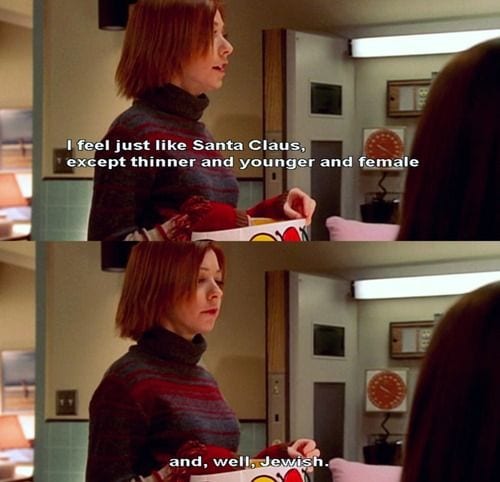
But the thing is, we don’t, like, turn off from being Jews if it’s not relevant to the conversation. We especially can’t in today’s climate. And I’m sorry, but it’s palpable in more ways than correcting someone during the holidays.
Willow comes out during the show’s run. She practices witchcraft. Both these things, which are so crucial to her identity, would absolutely intersect with her Jewishness, especially since there’s a sort of innate…survivability this all connects to. It’s hard to explain and it’s not like there’s a perfect way to go about showing it, but there’s a reason we’re all about intersectional feminism here. Because intersecting identities matter to personhood, and therefore to characters.
Keeping Jewishness relegated to a last name ending in “stein” or “it’s a holiday party!” is a touch limited. Looking at you, Felicity Smoak.
Friends is far and away the worst example. I don’t even mind that Ross and Monica have a non-Jewish mother, especially when Elliott Gould’s Jack Geller is just 100% perfect. What drives me bonkers is that while both Ross and Monica have a fair bit of “Jewish in name only” going on with the writing, Ross is the only one of the two allowed to actually assert his Jewishness. Half of this is because he’s played by David Schwimmer, and his character is a perpetual whiner who is terrified of germs and went through the sensitive musician stage in college.
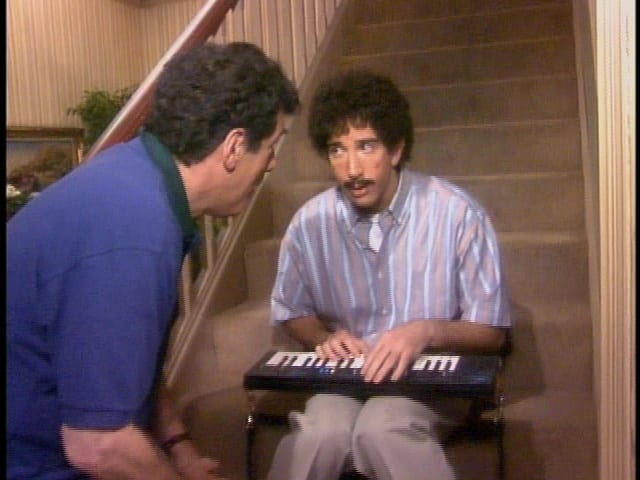
And yeah, maybe someone other than Courtney Cox could have brought a more authentic representation to the table, but the other half is most definitely the writing. We see Ross explicitly mention buying Hanukkah gifts and teaching his son, Ben, about the Jewish faith. Yes, it’s relegated to Hanukkah. (There are other holidays that matter to us a lot more, you know. Hanukkah is kind of not all that important.) But still, it’s something. For Monica? Apparently her immaculately decorated Christmas tree is a standing tradition, and the role Judaism would play in her children’s lives with Chandler Bing wasn’t even worthy of a conversation. We just…knew she was Jewish because we were told. And she was the sister of Ross, who seemed pretty Jewish.
Adding insult to injury, there was a character that is the epitome of a JAP (Jewish American Princess): last name Green, super spoiled and materialistic, got a nose job for her 16th birthday, had a father who worked as a doctor and habitually stiffed servers on tips at restaurants, called her grandmother “Bubbe”, was from Long Island… Do I really need to keep going?
But yet Rachel was just, not Jewish. And yeah, I am the person who just said that Jewishness is more than asserting things around the holidays, and when there’s good coding Jews can still pick up on it without the character mentioning anything. But if you’re giving us a character who explicitly celebrates Christmas despite living up to every stereotype, an explanation might be in order? Even if it’s like “oh hey Rachel just likes Christmas shit because she’s a spoiled JAP”? Literally anything other than just the writers telling us she’s Jewish (and apparently ‘more of a Jew’ than Ross and Monica…what?) later?
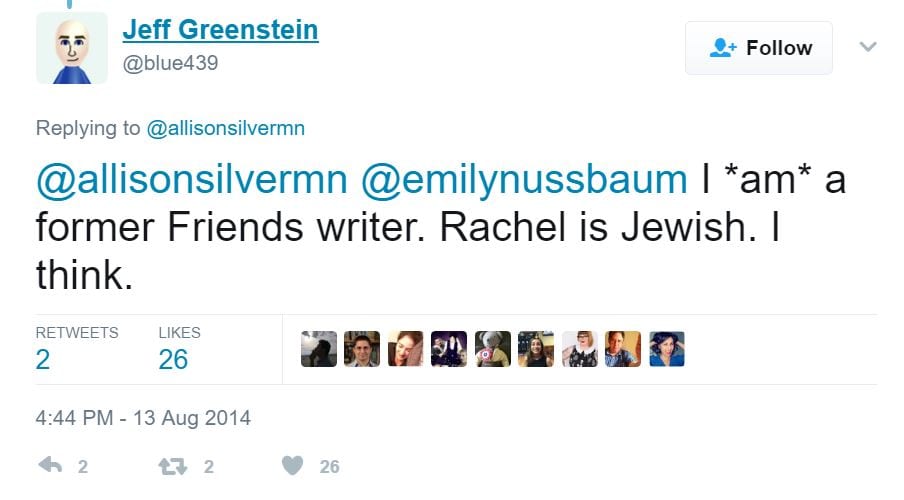
God, at least Dumbledore’s relationship with Grindelwald being ambiguous was supposed to be somewhat of the point. And don’t give me the “it was the 90s” excuse, or act like this wouldn’t have come up in her relationship with Ross (a nice, Jewish boy!). Mary Tyler Moore broke that ground with Rhoda in the 70s.
However, I think my favorite example of an Informed-Jewish woman has to be from Mr. & Mrs. Smith, where at the very end of the movie, Brad Pitt and Angelina Jolie are confessing secrets they’ve kept from one another during their five years of marriage, and Jolie just goes, “I’m Jewish.” Of course you are. I could totally tell. And of course it never came up in your marriage. Why would it? It’s just some trivia.
Compare this to Jewish men, not that there’s a wealth, who are allowed to simply be super Jewish. Think Schmidt from New Girl.
Look, there are good examples of Jewish women in media out there (I’m told Grace Adler is well-done?). But there is a disconcerting pattern where it seems as though it’s more acceptable for Jewish men to, well, act Jewish. And I’m sorry, but I shouldn’t have to have a Bachelor–parody show be the best representation on TV:

Give me Jewish women. Give me a passing mention of a holiday that isn’t Hanukkah. Give me a character who has to call their mom back within five minutes before she’s assumed to be dead.
Or, ya know, just give me more Kate Kane.
